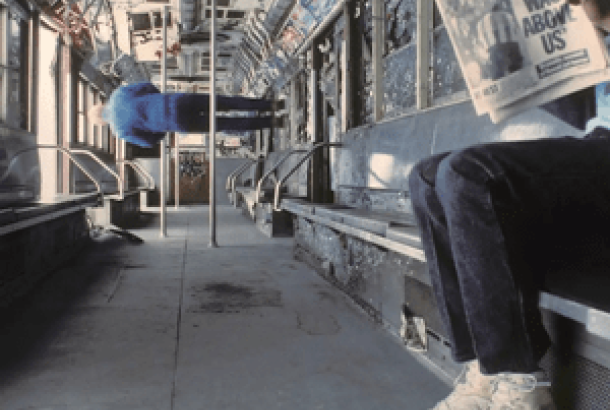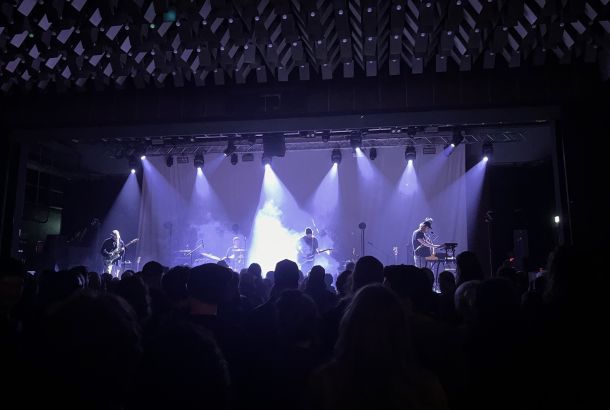Just another indie banned name
What’s in a name? Viet Cong, the Canadian post-punk quartet, recently announced that they were changing their name after accusations that it was an example of cultural insensitivity, trivialising the atrocities during the Vietnam War. The band issued a statement stating they “never intended for [it] to be provocative or hurtful,” but it did little to endear them to the people indignantly posting their anger on social media or taking to e-petition sites. It didn’t help either that the band are comprised of four white men, with many bloggers lambasting them for ostensibly indulging in smug “white privilege.”
It is a strange state of affairs: forty years ago, a post-punk band with a provocative name would be positively quotidian. Joy Division were named after the prostitution wing of Nazi concentration camps. Andy Gill of Gang of Four (another band with a subversive name) defended Viet Cong on the grounds the internet outrage was “illiberal, undemocratic and anti-progressive”.
Controversial band names weren’t limited to punk. Soft-rock heroes Steely Dan were named after a strap-on dildo in Burroughs’ novel Naked Lunch. 80s pop doyens Spandau Ballet took their moniker from the common slang for the twitching “dance” of hanged Nazi war criminals. Lest we forget, Kasabian are named after Linda Kasabian, a member of Charles Manson’s infamous cult and his getaway driver. Slaves have also come under fire, their name accused of racial insensitivity. But that objection is itself problematic: It suggests that “slaves” can only ever be associated with the plight of subjugated African slaves in the 18th century, rather than slavery in and of itself.
It is also an aggravating state of affairs. While it is true that Viet Cong may be a naïve choice for a band name, one that has caused many people significant pain and offence, its censorship would be a tremendous shame. Censorship only leads to a paranoid culture that cossets our sensibilities and self-righteousness. However indirectly, band names that evoke violent and uncompromising imagery ultimately force us to confront difficult subjects. It, to some degree, erases taboos—even if it might well be distressing, shocking and in poor taste.
Censorship closes down any sort of debate or dialogue in art; it prohibits people from engaging with questionable material or coming to a conclusion of their own. Censorship is didactic and refuses to treat consumers like adults. That said, we must be careful not to ignore the concerns of the offended people who dismiss Viet Cong. As a Guardian article that was critical of Tyler the Creator’s ban from performing in the UK makes clear, “free speech absolutism is as much the province of idiots and headbangers as is kneejerk censorship, and often has a pernicious and prejudiced agenda of its own.” Such is the need for taboo-smashing debate.
Furthermore, some of the most offensive band names in music often invite baffled amusement or even laughter, which was my immediate response after Googling a list of genuinely terrible names. They were in very bad taste, but also absurd and ridiculous. You can’t take many of them very seriously: AIDS Wolf and Gay Witch Abortion just sound silly. They make Viet Cong look a little quaint.
Moreover, it could be possible that Viet Cong is open to multiple interpretations. Maybe it represents a Dadaist impulse for being intentionally offensive and provocative? Perhaps it continues Dada’s insurrectionary commitment to destroying bourgeois contentment. Who’s to say that Viet Cong doesn’t express an agitated and mischievous post-colonial ideology? Maybe it represents the skewering of liberal sensibilities? Maybe its purpose is to make uncomfortable the very people calling for the name-change, the privileged western folk on their laptops typing with anger about it? To remind them of the horrors of that conflict? If Tyler the Creator’s ban tells us anything, it is that censorship only lends an attractive enigmatic aura to the group being censored—more people will actually gravitate to them. For the sake of ‘the group formerly known as Viet Cong’, let’s hope so: their music is what we should all be really talking about.







